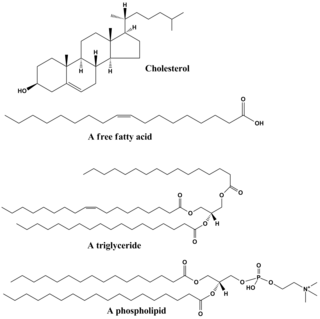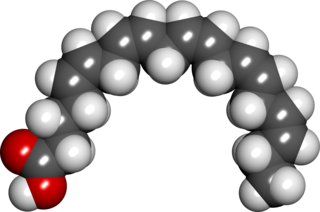Related Research Articles

In nutrition, biology, and chemistry, fat usually means any ester of fatty acids, or a mixture of such compounds, most commonly those that occur in living beings or in food.

Lipids are a broad group of naturally-occurring molecules which includes fats, waxes, sterols, fat-soluble vitamins, monoglycerides, diglycerides, phospholipids, and others. The functions of lipids include storing energy, signaling, and acting as structural components of cell membranes. Lipids have applications in the cosmetic and food industries, and in nanotechnology.
Omega−3 fatty acids, also called Omega-3 oils, ω−3 fatty acids or n−3 fatty acids, are polyunsaturated fatty acids (PUFAs) characterized by the presence of a double bond, three atoms away from the terminal methyl group in their chemical structure. They are widely distributed in nature, being important constituents of animal lipid metabolism, and they play an important role in the human diet and in human physiology. The three types of omega−3 fatty acids involved in human physiology are α-linolenic acid (ALA), eicosapentaenoic acid (EPA) and docosahexaenoic acid (DHA). ALA can be found in plants, while DHA and EPA are found in algae and fish. Marine algae and phytoplankton are primary sources of omega−3 fatty acids. DHA and EPA accumulate in fish that eat these algae. Common sources of plant oils containing ALA include walnuts, edible seeds, and flaxseeds as well as hempseed oil, while sources of EPA and DHA include fish and fish oils, and algae oil.
Essential fatty acids, or EFAs, are fatty acids that humans and other animals must ingest because the body requires them for good health but cannot synthesize them.

Margarine is a spread used for flavoring, baking, and cooking. It is most often used as a substitute for butter. Although originally made from animal fats, most margarine consumed today is made from vegetable oil. The spread was originally named oleomargarine from Latin for oleum and Greek margarite. The name was later shortened to margarine.
A saturated fat is a type of fat in which the fatty acid chains have all single bonds. A fat known as a glyceride is made of two kinds of smaller molecules: a short glycerol backbone and fatty acids that each contain a long linear or branched chain of carbon (C) atoms. Along the chain, some carbon atoms are linked by single bonds (-C-C-) and others are linked by double bonds (-C=C-). A double bond along the carbon chain can react with a pair of hydrogen atoms to change into a single -C-C- bond, with each H atom now bonded to one of the two C atoms. Glyceride fats without any carbon chain double bonds are called saturated because they are "saturated with" hydrogen atoms, having no double bonds available to react with more hydrogen.
An unsaturated fat is a fat or fatty acid in which there is at least one double bond within the fatty acid chain. A fatty acid chain is monounsaturated if it contains one double bond, and polyunsaturated if it contains more than one double bond.

Omega-6 fatty acids are a family of polyunsaturated fatty acids that have in common a final carbon-carbon double bond in the n-6 position, that is, the sixth bond, counting from the methyl end.
Monounsaturated fats are fatty acids that have one double bond in the fatty acid chain with all of the remainder carbon atoms being single-bonded. By contrast, polyunsaturated fats have more than one double bond.

Cat food is food specifically designed for consumption by cats. As obligate carnivores, cats have specific requirements for their dietary nutrients, namely nutrients found only in meat, such as taurine, arginine, and Vitamin B6. Certain nutrients, including many vitamins and amino acids, are degraded by the temperatures, pressures and chemical treatments used during manufacture, and hence must be added after manufacture to avoid nutritional deficiency.

Eicosapentaenoic acid is an omega-3 fatty acid. In physiological literature, it is given the name 20:5(n-3). It also has the trivial name timnodonic acid. In chemical structure, EPA is a carboxylic acid with a 20-carbon chain and five cis double bonds; the first double bond is located at the third carbon from the omega end.

Docosahexaenoic acid (DHA) is an omega-3 fatty acid that is a primary structural component of the human brain, cerebral cortex, skin, and retina. In physiological literature, it is given the name 22:6(n-3). It can be synthesized from alpha-linolenic acid or obtained directly from maternal milk, fatty fish, fish oil, or algae oil.
Polyunsaturated fatty acids (PUFAs) are fatty acids that contain more than one double bond in their backbone. This class includes many important compounds, such as essential fatty acids and those that give drying oils their characteristic property.

Medium-chain triglycerides (MCTs) are triglycerides with two or three fatty acids having an aliphatic tail of 6–12 carbon atoms, i.e. medium-chain fatty acids (MCFAs). Rich food sources for commercial extraction of MCTs include palm kernel oil and coconut oil.

Mary Gertrude Enig was a nutritionist and researcher known for her unconventional positions on the role saturated fats play in diet and health. She promoted skepticism towards the consensus in the scientific and medical communities that diets high in saturated fats can contribute to development of heart disease, while she advocated for a diet based on whole foods and rich in certain saturated fats.
Only two essential fatty acids are known to be essential for humans: alpha-linolenic acid and linoleic acid. The biological effects of the ω-3 and ω-6 fatty acids are mediated by their mutual interactions. Closely related, these fatty acids act as competing substrates for the same enzymes. The biological effects of the ω-3 and ω-6 fatty acids are largely mediated by essential fatty acid interactions. The proportion of omega-3 to omega-6 fatty acids in a diet may have metabolic consequences. Unlike omega-3 fatty acids and omega-6 fatty acids, omega-9 fatty acids are not classed as essential fatty acids because they can be created by the human body from monounsaturated and saturated fatty acids, and are therefore not essential in the diet.

Alice Hinda Lichtenstein is an American professor and researcher in nutrition and heart disease. In 2006, Shape magazine named Lichtenstein one of ten "Women Who Shaped the World". In 2019, Tamar Haspel called her a "grande dame of nutrition."

Cooking oil is plant, animal, or synthetic liquid fat used in frying, baking, and other types of cooking. It allows higher cooking temperatures than water, making cooking faster and more flavorful, while distributing heat and sometimes imparting its own flavor. Cooking oil is also used in food preparation and flavoring not involving heat, such as salad dressings and bread dips, and may be called edible oil.

Nutritional immunology is a field of immunology that focuses on studying the influence of nutrition on the immune system and its protective functions. Part of nutritional immunology involves studying the possible effects of diet on the prevention and management on developing autoimmune diseases, chronic diseases, allergy, cancer and infectious diseases. Other related topics of nutritional immunology are: malnutrition, malabsorption and nutritional metabolic disorders including the determination of their immune products.

Trans fat, also called trans-unsaturated fatty acids, or trans fatty acids, is a type of unsaturated fat that occurs in foods. Trace concentrations of trans fats occur naturally, but large amounts are found in some processed foods. Since consumption of trans fats is unhealthy, artificial trans fats are highly regulated or banned in many nations. However, they are still widely consumed in developing nations, resulting in hundreds of thousands of deaths each year. Serious interest has been given to determining their sources, to better avoid them.
References
- ↑ European Food Information Council. "Highlights from the 11th Biennial congress of the international society for the study of fatty acids and lipids (ISSFAL) 2014", 26 March 2016. Retrieved 21 July 2019.
- ↑ Ravn, Karen. "Study links Greek diet to longer life", Los Angeles Times, 21 November 2011. Retrieved 21 July 2019.
- ↑ Payer, Lynn. "Food Facts", The New York Times , 17 April 1988. Retrieved 21 July 2019.
- ↑ Greenberg, Paul. The Omega Principle: Seafood and the Quest for a Long Life and Healthier Planet, Penguin Books, 2018, ISBN 9780143111115 (paperback), pages 40–41.
- ↑ Allport, Susan. The Queen of Fats: Why Omega–3s Were Removed from the Western Diet and What We Can Do to Replace Them, University of California Press, 2006, ISBN 9780520253803, pages 108–112.
- ↑ Bourne, Jerome. "Good genes a factor in what you can eat", New Castle News, March 1, 1994, page 14. (subscription required)